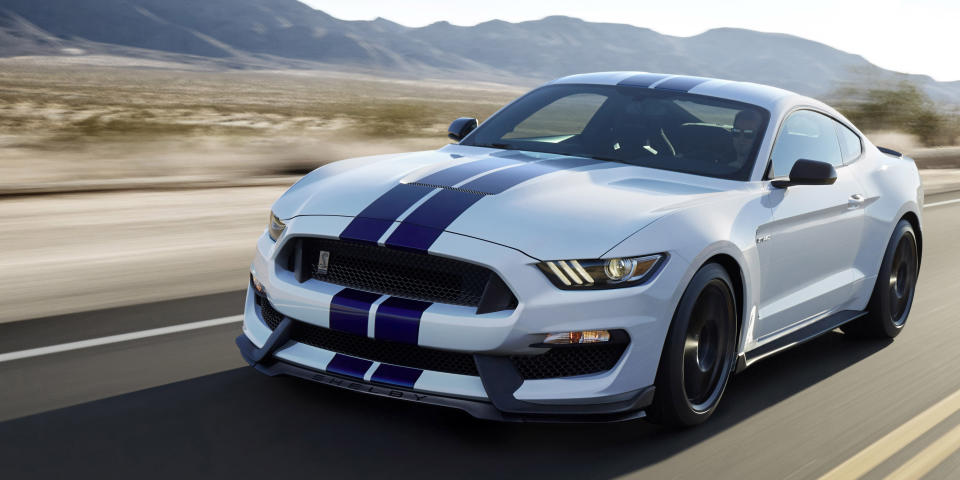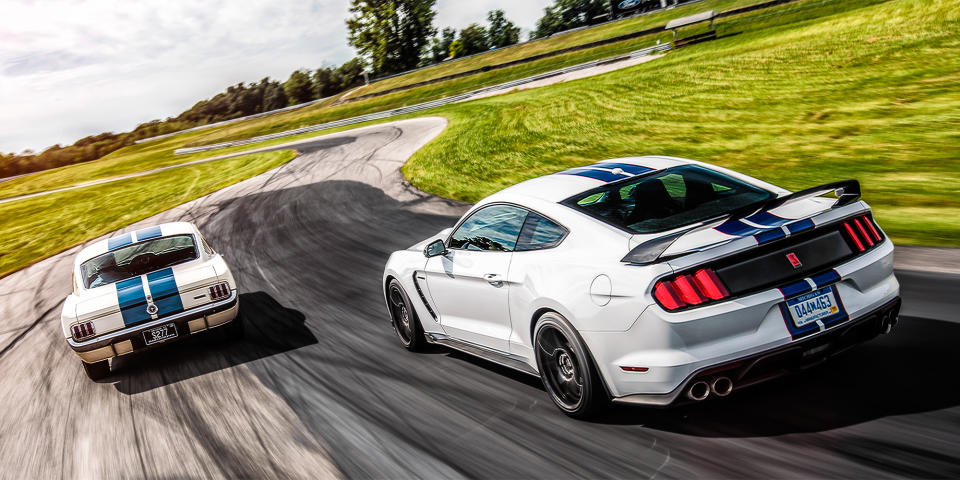The New High-Performance Fords Could Fail the Same Way the Pontiac GTO Did

"Forty grand of additional dealer markup in a single photo." The photo to which the caption referred showed two new Shelby Mustangs and a Focus RS on the dealership floor. My first thought was a quote from the movie Clerks: "This job would be great it it wasn't for the (blank)ing customers." Only the way I heard it in my head was: This car business would be great if it wasn't for the (blank)ing dealers.
Imagine that you're part of the various "skunkworks" operations at Ford. You've moved heaven and earth to find budget, engineering time, production time, supplier time, and manpower to turn lead into gold. Against all odds, you've gotten every level of the corporation to sign off on a project like the Mustang GT350 or the Focus RS–small-batch stuff that consumes massive amounts of effort while having less impact on the bottom line than the most insignificant additional-equipment package for the F-150 pickup does.
It's no joke getting a performance variant of anything through a modern multinational like Ford or General Motors. You spend more time justifying your project's existence than you spend actually building the thing. It's the first thing that people want to cut when times are tough, and the last thing they want to fund when the market rebounds.
Still, after all is said and done you've actually pulled it off. You've convinced the bean-counters to let you build an 8,250-rpm V8 or a 350-horsepower all-wheel-drive hatchback in candy-apple neon blue. You load up the factory orders, you watch the cars get rave reviews… and then everything just comes to a sudden, high-impact STOP at the dealers. The cars that you sweated blood to get in the hands of customers are glued to the showroom floors while the polyester-suit types running the dealers try to squeeze an extra ten or twenty grand worth of profit out of them.

"It's perfectly legal!" the sales managers will say, and they are right. "If we have to discount slow-selling cars, shouldn't we be able to mark-up the hot ones?" And that sounds fair on the surface of things. There's just one little problem: This kind of raw greed really only works with cost-no-object rich-boy toys like the Ferrari 458 Speciale or Ford's own GT. Those cars are already priced into the stratosphere. They aren't being purchased by people who are watching their budgets or trying to stretch into a dream car. With very few exceptions, if you can afford $300k for a toy you can probably afford $400k.
That's just not the case with the fast Fords at the humbler end of the socioeconomic spectrum. My experience selling Fords and working for Ford Credit tells me that most of your buyers for those products are stretched pretty thin. They don't have an extra ten grand to throw at a car, and the banks aren't interested in loaning them that ten grand either. So they end up buying something else, while the marked-up cars continue to sit in the showroom.
We've seen this movie before–with the 5.7-liter Pontiac GTO. This was a product that had huge momentum and tremendous buzz when it hit the showroom floors, but the dealers saw it as a chance to make a down payment on their next boat so the first allocation of cars wound up dead on arrival, sticker-shackled to the ground by additional markup. As more GTOs came off the boat from Australia, the dealers started to relax their grip a bit, but by then the word was out on the car that you couldn't get a decent price on one, so the buyers didn't bother to come in.
When the significantly-improved LS2-powered GTO arrived a year later, it found its older cousins still cluttering up the lots. All of a sudden, the same dealers who had asked twenty grand over sticker were desperate to get rid of their inventory. All this did was convince buyers that the cars were overpriced and didn't retain their value, which harmed sales of the brand-new GTO as well.

It's easy to imagine a scenario where the dealers sold their first GTO allocations at or below sticker, building sales momentum and customer excitement. The lots could have been empty by the time the bigger-bore car arrived, and the momentum would have picked up further from there. Maybe some of that "halo effect" might have actually rubbed off on the more modest Pontiac offerings. It's a stretch to say it, but if the Pontiac dealers had handled the GTO properly, maybe there might still be Pontiac dealers around today.
The problem is that while even the most incompetent car company thinks in terms of product cycles and multi-year plans, the average dealership is run on a thirty-day basis. Given a chance to swing for the fences with five or ten grand worth of dealer markup, most of the sales managers out there will cheerfully forget all about "brand image" or long-term planning. And the longer a car sits on the showroom floor with that markup sticker, the more "sunk cost" incentive there is for the manager to keep the sticker on it just so he prove that he was right about putting it on there in first place. I'd call it fiddling while Rome burns, but at least Nero was reputed to be a competent musician. Most dealership sales personnel aren't even good at selling cars.
I assure you that plenty of intelligent people at General Motors understood what a disaster this short-term dealer mindset was for the Pontiac brand, the same way a lot of intelligent people at Ford are probably holding their head in their hands watching their dealers try to screw an extra five grand out of Focus buyers. The problem is that the separation between manufacturer and dealer is enshrined in franchise law pretty much across every one of the fifty states. Believe me, Ford would love to have you visit an "RS/Shelby Boutique" where you could enjoy a Nordstrom's approach to buying your next performance car–but the laws on the books, and their existing contracts, mean that they are forced, like the old general once said, to go to war with the army they have, not the army they want.

This is what I'm afraid will happen, because it's happened in the past: The dealers will misuse their additional-markup privileges to kill the market for the Focus RS and the standard non-R versions of the Shelby GT350. Then, after the market dries up, they will complain to Ford that the cars don't sell, which will give the bean counters additional ammunition to refuse requests for future fast-Ford projects. Before you know it, the closest thing you'll be able to get to a factory-build Ford sporting vehicle will be the tape-and-stripe packages that reigned supreme forty years ago in the Malaise Era.
The only people who can change this state of affairs are the people who have decision power at the dealerships. I know that a lot of them read this website, at least occasionally. So if you are a sales manager or a general manager at a Ford dealer, I am begging you: Sell these cars to the people who want them, at a fair price, as quickly as you can. Try to be part of the solution instead of being part of the problem. If you are a Tom Cruise fan, then imagine him telling you to "Help Ford help you!" Or if, like me, you read the Bible a lot as a child, imagine Moses telling you to "Let My Shelbys Go!" Or maybe you're a fan of the original Top Gear, in which case I'm going to suggest that you… "Get off your RS!"
Born in Brooklyn but banished to Ohio, Jack Baruth has won races on four different kinds of bicycles and in seven different kinds of cars. Everything he writes should probably come with a trigger warning. His column, Avoidable Contact, runs twice a week.
You Might Also Like

